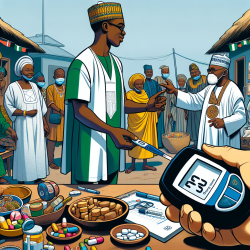The management of diabetes, a chronic illness with no known cure, relies heavily on effective self-management strategies. However, in Nigeria, the sociocultural landscape presents unique challenges that healthcare providers must navigate to offer effective support. A recent study titled "An Interpretive Description of Sociocultural Influences on Diabetes Self-Management Support in Nigeria" sheds light on these challenges and offers insights that can help practitioners improve their skills and patient outcomes.
Sociocultural Factors Impacting Diabetes Management
The study identifies several key sociocultural factors that influence diabetes self-management in Nigeria:
- Belief in Supernatural Origins: Many patients attribute the cause of diabetes to supernatural forces or curses. This belief often leads them to seek spiritual or traditional remedies instead of biomedical treatments.
- Individual–Family Interdependence: In Igbo culture, family plays a central role in decision-making and care responsibilities. This interdependence can both support and hinder effective diabetes management.
- Myths and Limited Understanding: Misconceptions about diabetes and its management are prevalent, leading to poor adherence to medical advice.
- Lack of Health Insurance and Poverty: Financial constraints force many patients to pay out-of-pocket for care, limiting their access to necessary treatments.
- Rigidity of Healthcare Models: The hierarchical structure of healthcare services is more suited to acute care than chronic disease management, creating gaps in patient education and support.
Strategies for Healthcare Providers
The findings suggest several strategies that healthcare providers can implement to improve diabetes self-management support:
- Cultural Sensitivity Training: Providers should be trained to understand and respect cultural beliefs while gently correcting misconceptions with factual information.
- Family-Centered Care Approaches: Engage family members in the care process to leverage their influence positively. Educate them alongside patients about diabetes management.
- Enhanced Patient Education: Develop structured education programs that address common myths and provide clear guidance on managing diabetes within the cultural context.
- Advocate for Policy Changes: Push for improvements in healthcare infrastructure and insurance coverage to reduce financial barriers for patients.
- Interprofessional Collaboration: Foster teamwork among healthcare providers to ensure comprehensive care that addresses all aspects of diabetes management.
The Need for Further Research
This study highlights the importance of understanding the sociocultural context in which patients manage their health. Practitioners are encouraged to conduct further research into how these factors affect diabetes management in different regions and among various ethnic groups within Nigeria. Such research can inform more tailored interventions that resonate with patients' lived experiences.
The insights from this study are a step towards developing robust self-management support programs that are culturally sensitive and contextually appropriate. By incorporating these findings into practice, healthcare providers can enhance their ability to support patients effectively, improving health outcomes across Nigeria's diverse population.
To read the original research paper, please follow this link: An Interpretive Description of Sociocultural Influences on Diabetes Self-Management Support in Nigeria.










